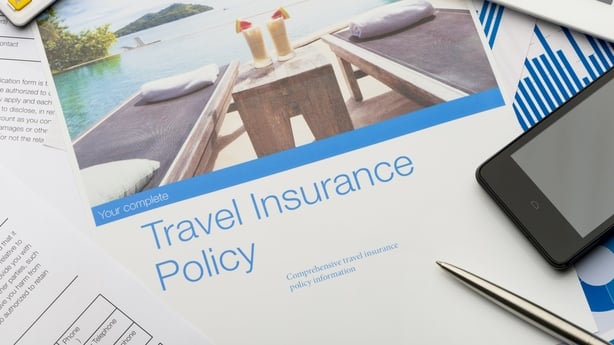Up until recent years, travel insurance came largely under the heading of 'discretionary' holiday spending for most of us.
However, the Covid-19 pandemic may have brought about a permanent change in our collective relationship with that product.
The need to cancel flights and accommodation - particularly in the early stages of the outbreak as we made decisions about whether or not to adjust our travel plans - saw many frantically scrambling for information on what our rights and entitlements were.
For those with travel insurance, the 'small print' was poured over in an effort to ascertain what was included in our policies and what was not.
It's a practice that we probably should always have adopted but it certainly has come onto the radar in a bigger way now, as well as the product itself.
So, it's more than a nice to have?
In short, yes. It's one of those financial products we hope we never have to draw on, but the security of having a travel insurance policy is worth the fairly modest price (relative to the potential costs) of putting one in place.
As with most insurance products, policies come with varying levels of 'bells and whistles', depending on your needs.
There are policies targeting different groups of travellers such as backpacker insurance, products for business travel or those aimed at people aged over 65.
Then you have the option of purchasing insurance for a single trip or multiple trips.
Anyone undertaking more than two trips a year should consider getting annual cover.
All, naturally, have different price points.
A policy for a single trip can cost less than €20 per person, and in some cases, you can get it for under €10.
But, as with all products, be aware of what you're getting for the price you pay.
"Although it's tempting to pick the cheapest policy, it’s not always a good idea with travel insurance. The cheapest policies will offer less cover and have more exclusions," the website switcher.ie points out.
"Pick a policy that fully covers the cost of the holiday and your belongings and find a policy that includes enough financial protection for you and your family."
Don't scrimp - particularly if travelling outside of Europe
If travelling in Europe, the very least you should have is a European Health Insurance Card (EHIC).
If you fall ill, this allows a European Union citizen to be treated in another member state's public health system (including the European Economic Area and Switzerland) as if you were a citizen of that country.
It is an excellent benefit, but it has limited scope.
If, for instance, you need to be airlifted back to Ireland, it will not cover the cost of that transport.
In addition, if you need to cancel the trip prior to departure due to illness at home, a travel insurance policy would be required to claim for that.

Travelling outside of Europe makes a good travel insurance largely indispensable and it doesn't have to be ridiculously pricey either.
Hospitalisation for injury or illness in far flung destinations has left people with bills that could only be described as 'eye watering'.
Procedures - that would ordinally be covered by health insurance or a medical card here - in reality cost tens of thousands of euro.
If you require such surgery abroad, a travel insurance policy with adequate levels of cover is essential.
What else do travel insurance policies cover?
Policies generally cover items such as damaged or delayed luggage, cancelled flights, loss or theft of money or passport and sometimes the cost of an emergency return flight if a close relative dies.
The level of cover is largely reflective of the price, but consumers should make themselves aware of what they are covered for in advance of purchasing the policy.
"Generally, if something is not specified, it is not [covered]," the Competition and Consumer Protection Commission (CCPC) advises on its website.
"Always check your policy or ask your provider, especially if you are worried about particular risks," it warns.
It advises that policies will usually not cover pre-existing conditions that result in illness or incapacity while abroad unless the insurer is aware of it in advance and accepts the risk.
"They may place an extra premium on your policy, but if you do not tell them the truth, any claim you may make will not be valid," it warns.
If an individual travels against the advice of a doctor, they may not be covered under the insurance policy.
Likewise for travellers who visit an area of political unrest or to an area against the advice of the Department of Foreign Affairs.
Can I claim if I haven't even left for the airport?
You can, and this is why it is good practice to plan ahead and put the policy in place when booking a trip.
In fact, around one in three of all travel insurance claims made over the past 30 months have arisen on foot of holiday cancellations, according to figures from Peopl Insurance.
"Our figures show that it is essential for holidaymakers to take their cover out at the time of booking their holiday. Holidaymakers who only take out travel insurance a week or two before they travel – or, worse again, by doing so on their way to, or even from, the airport are leaving a major benefit of their travel insurance behind, and limiting the benefit of their holiday cancellation cover," Paul Walsh, CEO of Peopl said.
It may be death or illness of a family member or indeed one of the travelling party.
One possible eventuality to prepare for is a growing wave of industrial unrest among aviation industry workers across Europe which may lead to flight cancellations or missed flights due to lengthy airport queues.
"Some travel insurance policies will cover you if you have to abandon your holiday, if you miss your flight or if your holiday is delayed as a result of an unexpected work stoppage or strike at an airport or ferry port.
"But other travel insurers don’t cover strikes and with some policies, the cover is more restricted than others. So, it is very important to check the small print of a travel insurance policy before you buy," Mr Walsh advises.
Another increasingly prevalent factor in holiday disruption is extreme weather events with wildfires ravaging parts of Italy, France and Portugal last year which saw Irish tourists being evacuated from some areas.
A repeat of those events is being witnessed in Spain this year.
"Again, you need to check the small print on your policy," Peopl Insurance explains.

Don't over-insure either
This is a mistake that many of us make without even realising it.
Usually, it applies to items like phones or other electronic items for which we procure gadget insurance - which can be pricey - only to find out that such items are already covered under a home and contents policy.
When it comes to travel insurance, make sure you don't already have it, for example, as a free perk with a credit card.
Or if you have year-round travel insurance, don't end up doubling up on your cover by taking out a separate policy for a trip.
If travel insurance is not an option for a budget conscious traveller, make sure at the least to have the EHIC.
In addition, under EU laws, you are entitled to compensation if your flight is delayed by more than three hours, which is often better than what you’d get under many travel insurance policies.
However, if you're going beyond Europe, investing in a decent travel insurance policy is advisable.
Making a claim
Knowing the correct procedures to follow in the event of an incident abroad can make all the difference between making a successful claim and being denied.
Policies will differ depending on the provider and some will have quite specific instructions, the CCPC points out.
"Some policies, for example, will insist that you get translated police reports within a timeline," it advises.
"Many may need you to contact their medical or emergency helpline as soon as possible after the event in order for your claim to be accepted. Read your policy before you travel so you are aware of these conditions in advance, as you never know when you will need to make a claim," the CCPC adds.
Keeping all documents and claiming as soon as possible upon returning home is also advisable as there may be a time limit for making claims.
"You will be expected to take certain steps in some cases. For example, if your possessions are stolen, then you should report it to the local police, or if you have to cancel a trip due to ill health, then a medical report might be necessary," the CCPC advises.







